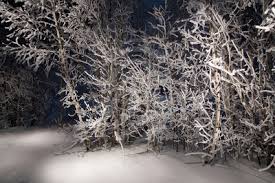Here’s another of my favourite poems, by one of my favourite poets, the wonderful Robert Frost. There are several I could have chosen – The Road Not Taken; Departmental; A Considerable Speck; Fire and Ice; Birches – if you don’t know these, I urge you to seek them out.
STOPPING BY WOODS ON A SNOWY EVENING
Whose woods these are I think I know.
His house is in the village, though;
He will not see me stopping here
To watch his woods fill up with snow.
My little horse must think it queer
To stop without a farmhouse near
Between the woods and frozen lake
The darkest evening of the year.
He gives his harness bells a shake
To ask if there is some mistake.
The only other sound’s the sweep
Of easy wind and downy flake.
The woods are lovely, dark, and deep,
But I have promises to keep,
And miles to go before I sleep,
And miles to go before I sleep.
This beautiful and deceptively simple poem has a hypnotic quality, like that of a dream. A lone rider pauses in a long journey to look at snow falling in the woods. There is a sense of isolation from the fact there is ‘no farmhouse near’, and the rider has stopped beside a ‘frozen lake’. There is even a sense of threat as it is ‘the darkest evening of the year’, which suggests it is deep winter and will be a long, cold night; not one in which most of us would like to be out in the wilds. The rider’s ‘little horse’ seems uncomprehending of a pause in such a frozen, unpromising place. An animal, the narrator claims, would not understand why they have stopped here, but I think I do.
The scene is mesmerising, with ‘downy flakes’ blanketing the beautiful woods in pure snow, in a quietude only snowfall can create. If a person stayed here too long, on this freezing night, he or she could freeze to death. And there is something deathly about this scene – the ‘darkest evening’, the woods being ‘lovely, dark, and deep’ – those commas after ‘lovely’ and ‘dark’ pacing the reader to space out those three adjectives, giving the impression of long steps forward into those beckoning woods.
But why do these winter woods beckon the rider, on this freezing night when any sensible person would be home and safe? This rider has ‘promises to keep’ – such a mysterious line which fills the reader with questions, what promises? and to whom? – and ‘miles to go before I sleep/And miles to go before I sleep.’ The simple yet beautiful repetition of that last line gives the emphasis of the rider’s heavy responsibilities elsewhere – where, what and to whom we will never know – but we feel the weight of them by hearing them twice. There is no time to sit and stare at snow when the night draws in, the weather is dangerously cold, and the rider is expected elsewhere, miles and miles from here. But the rider does not heed the practical nature of all these facts, and instead gazes upon these lovely woods instead. Perhaps the deep, dark woods represent death, a wish for death even. But they are also lovely – so maybe they could be a path one wishes to take, one yearns to take, away from life’s responsibilities, just for a moment, just this once; the lure of the open road on the repetitive journey to work, the idea of escape from one’s promises, into something wild, untouched by the world of people, away from villages, farms and safety, escape into the unknown. Haven’t we all felt like that, from time to time?
I’ve read that Frost didn’t like his poems to be analysed too closely, so I hope I haven’t done that, but just given a flavour of why I feel this poem is so beautiful and so disarmingly mysterious and lovely, just like those dark, deep woods.
